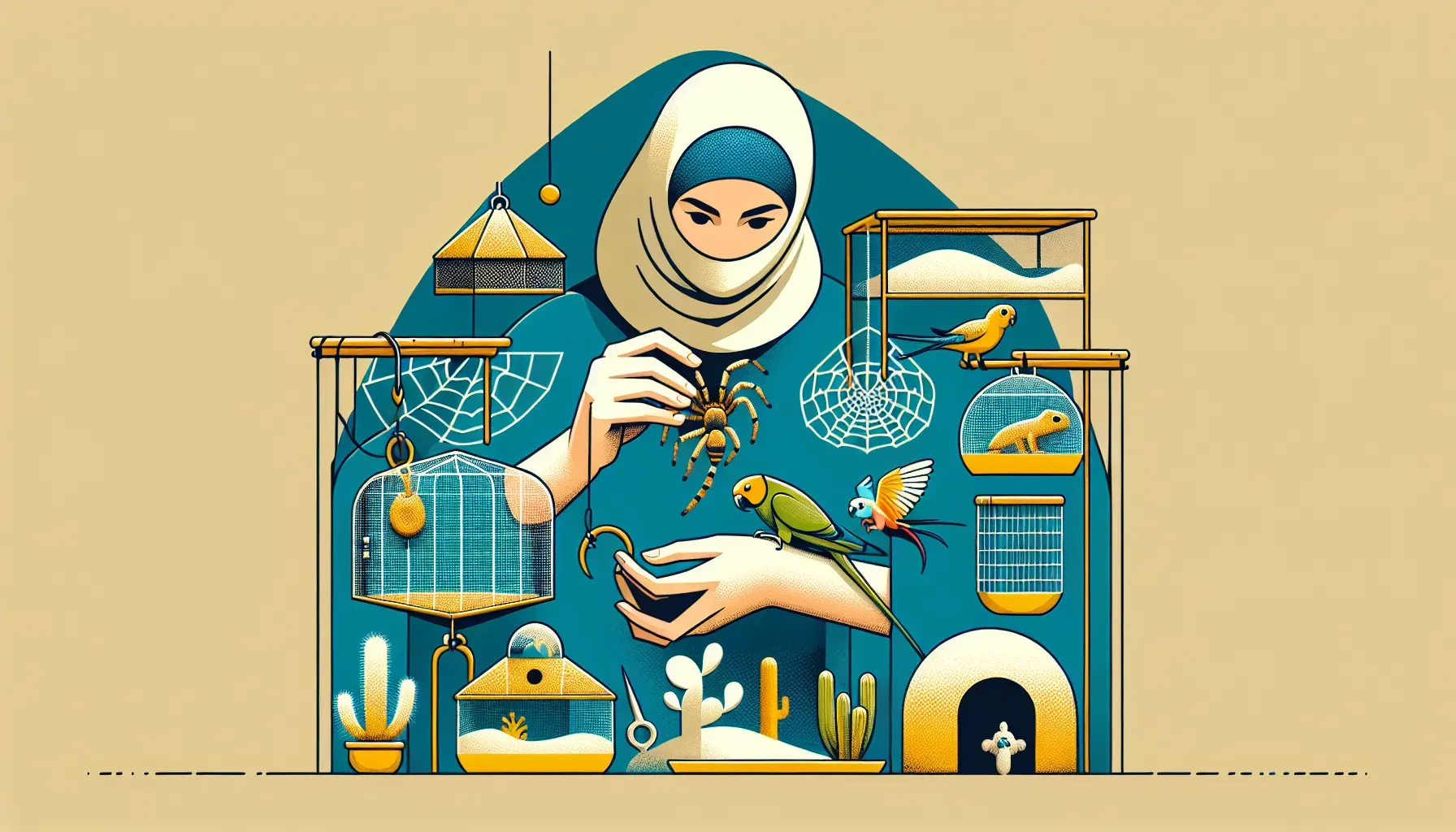
Exotic pets, with their unique needs and requirements, often pose challenges that differ greatly from those of conventional domestic animals. Providing personalized care for these unconventional companions is essential in ensuring their welfare and happiness. In this article, we delve into the art of personalized care for exotic pets, addressing their unique requirements and overcoming challenges through custom-tailored care plans while balancing individual needs and ethical considerations.
Caring for exotic pets involves understanding and addressing their distinctive requirements. Unlike traditional pets, exotic animals may have specific dietary, environmental, and social needs that require special attention. To address these unique requirements effectively, it's crucial to conduct thorough research and seek guidance from experienced exotic pet specialists.
Understanding the Unique Needs of Exotic Pets
Nutrition plays a vital role in the overall well-being of exotic pets. Their dietary needs can vary significantly based on species, age, and health conditions. Tailoring their diet to accommodate these specific requirements is essential for their health and vitality. For example, herbivorous reptiles such as tortoises and iguanas necessitate a diet rich in leafy greens and vegetables, while insectivorous species like sugar gliders and hedgehogs require a varied selection of live insects and supplements.
It’s imperative to understand the nutritional preferences and dietary restrictions of each exotic species to ensure their dietary needs are met effectively. Consultation with a knowledgeable exotic pet veterinarian can provide valuable insights into customizing nutrition plans for these unique companions.
Importance of Tailored Nutrition for Exotic Pets
The importance of environmental enrichment cannot be overstated when caring for exotic pets. Providing an environment that mirrors their natural habitat promotes mental stimulation, encourages natural behaviors, and enhances their overall welfare. Custom-tailored environmental enrichment is key to ensuring they thrive in captivity.
Creating customized enclosures that closely resemble the natural habitat of exotic pets is crucial for their well-being. For instance, reptiles native to desert regions require enclosures with ample basking spots and low humidity levels, whereas arboreal species benefit from vertically oriented terrariums with ample climbing opportunities. Moreover, providing hiding spots and complex structures within the enclosure helps satisfy their natural instincts while reducing stress.
Related Article: Budget-Friendly Pet Care Hacks for Every Fur Parent
Enhancing Welfare through Environmental Enrichment
Engaging exotic pets in enrichment activities designed specifically for their species can prevent boredom and promote mental stimulation. For example, offering puzzle feeders or engaging them in scent-based games can mimic natural foraging behaviors, keeping them mentally active and content. Additionally, providing suitable toys and interaction opportunities tailored to each species encourages physical exercise and social engagement.
Designing Enclosures to Mimic Natural Habitats
Exotic pets may present unique challenges due to their specialized care requirements and diverse behavioral characteristics. Crafting custom care plans that accommodate these challenges can help address various issues while fostering a harmonious relationship between the pet and its caregiver.
Related Article: Busy Bee? 5-Minute Pet Care Routines for On-The-Go Owners
Engaging Activities for Mental and Physical Stimulation
Understanding the behavioral patterns of exotic pets is essential for creating effective care plans. Certain species may exhibit distinct behaviors that require careful consideration, such as nocturnal activities in some reptiles or flock-based social behaviors in avian companions. Seeking expert advice and behavior consultations specific to the species can aid in formulating tailored care plans that address behavioral challenges effectively.
Maintaining the health of exotic pets often necessitates specialized care tailored to their unique physiology. Regular veterinary check-ups focusing on species-specific health concerns are essential for early detection of potential issues. Customizing health management plans considering the specific needs and susceptibilities of each species can aid in preventing diseases and promoting longevity.
Overcoming Challenges with Custom Care Plans
While catering to the individual needs of exotic pets is essential, it's equally important to uphold ethical considerations in providing personalized care services. Achieving a balance between fulfilling the pet's requirements and adhering to ethical standards ensures responsible ownership and positive outcomes for both the animal and its caregiver.
Behavioral Consultations for Individual Species
In instances where acquiring an exotic pet is considered, responsible breeding practices contribute to sustainable ownership while reducing the demand for wild-caught specimens. Seek reputable breeders adhering to ethical standards, promoting genetic diversity, and prioritizing the well-being of their animals. By supporting responsible breeding initiatives, individuals contribute to conservation efforts while ensuring the welfare of their prospective pets.
Health Management Strategies for Exotic Pets
Educating oneself about the responsibilities associated with owning an exotic pet is fundamental in maintaining ethical standards. Furthermore, advocating for ethical ownership practices within the exotic pet community fosters awareness about sustainable care approaches. Promoting humane treatment, responsible husbandry practices, and conservation efforts greatly contributes to establishing ethical guidelines within the community.
Personalized care for exotic pets requires a deep understanding of their individual needs combined with a commitment to ethical care practices. By customizing nutrition, environmental enrichment, behavioral management, health care plans, responsible breeding practices, and education initiatives tailored to specific species' requirements within a foundation of ethical considerations, caregivers can ensure a fulfilling life for their unconventional companions within a harmonious environment.
Frequently Asked Questions
Exotic pets often have specific dietary requirements based on their species, age, and health conditions. For instance, herbivorous reptiles like tortoises need a diet rich in leafy greens, while insectivorous species such as sugar gliders thrive on live insects. Understanding these needs is essential for their overall health and vitality.
To enhance the welfare of exotic pets, design enclosures that mimic their natural habitats. Include features like hiding spots, climbing structures, and appropriate humidity levels. Additionally, engage them with enrichment activities like puzzle feeders or scent-based games to stimulate their mental and physical well-being.
Custom care plans are vital for addressing the unique challenges posed by exotic pets. These plans consider individual species' behaviors and health needs, ensuring proper management and fostering a harmonious relationship between the pet and caregiver. Tailored approaches help prevent potential issues and promote longevity.






